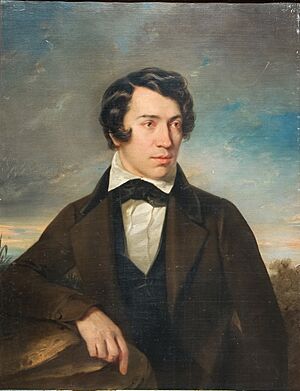Aleksey Khomyakov facts for kids
Aleksey Stepanovich Khomyakov (Russian: Алексе́й Степа́нович Хомяко́в) was a Russian thinker born on May 13, 1804, in Moscow. He passed away on October 5, 1860, also in Moscow. He was a theologian, philosopher, poet, and even an amateur artist. Khomyakov helped create the Slavophile movement. This movement believed Russia had its own special way of life, different from Western Europe. He became one of its most important thinkers. His son, Nikolay Khomyakov, later served as a speaker in the Russian parliament, known as the State Duma.
Biography
Khomyakov's entire life was centered in Moscow. He saw this city as the perfect example of the Russian way of life. He was successful as a landlord and enjoyed deep conversations. He did not publish much of his work during his lifetime. However, his friends and followers published his writings after he died. These works had a big impact on the Russian Orthodox Church. They also influenced Russian philosophers like Fyodor Dostoyevsky.
Khomyakov believed that both socialism and capitalism were not good. He thought they were problems that came from Western countries. He felt that Western societies failed to solve human spiritual issues. This was because they focused too much on competition. They did not focus enough on cooperation. He once said that "Rome kept unity but lost freedom." He also said that "Protestants had freedom but lost unity."
Khomyakov's main ideas were about a concept called sobornost. This is an old Slavonic word. It is similar to "catholicity" found in the Nicene Creed. It can be simply understood as "togetherness" or "symphony." Khomyakov saw the Russian obshchina (a traditional peasant community) as a great example of sobornost. He praised Russian peasants for their humble nature.
Khomyakov died from cholera. He caught the illness while trying to help a sick peasant. He was buried near his brother-in-law, Nikolai Yazykov. Another famous writer, Nikolai Gogol, was also buried nearby. Later, during the Soviet era, their bodies were moved. They were reburied at the Novodevichy Cemetery.
Works
- Полное собранiе сочиненiй. Томъ I-VIII. Москва, 1900-1914.
See also
 In Spanish: Alexéi Jomiakov para niños
In Spanish: Alexéi Jomiakov para niños
 | Selma Burke |
 | Pauline Powell Burns |
 | Frederick J. Brown |
 | Robert Blackburn |


